The Ill-Defined Space Global Orbital Launch Summary: 2024
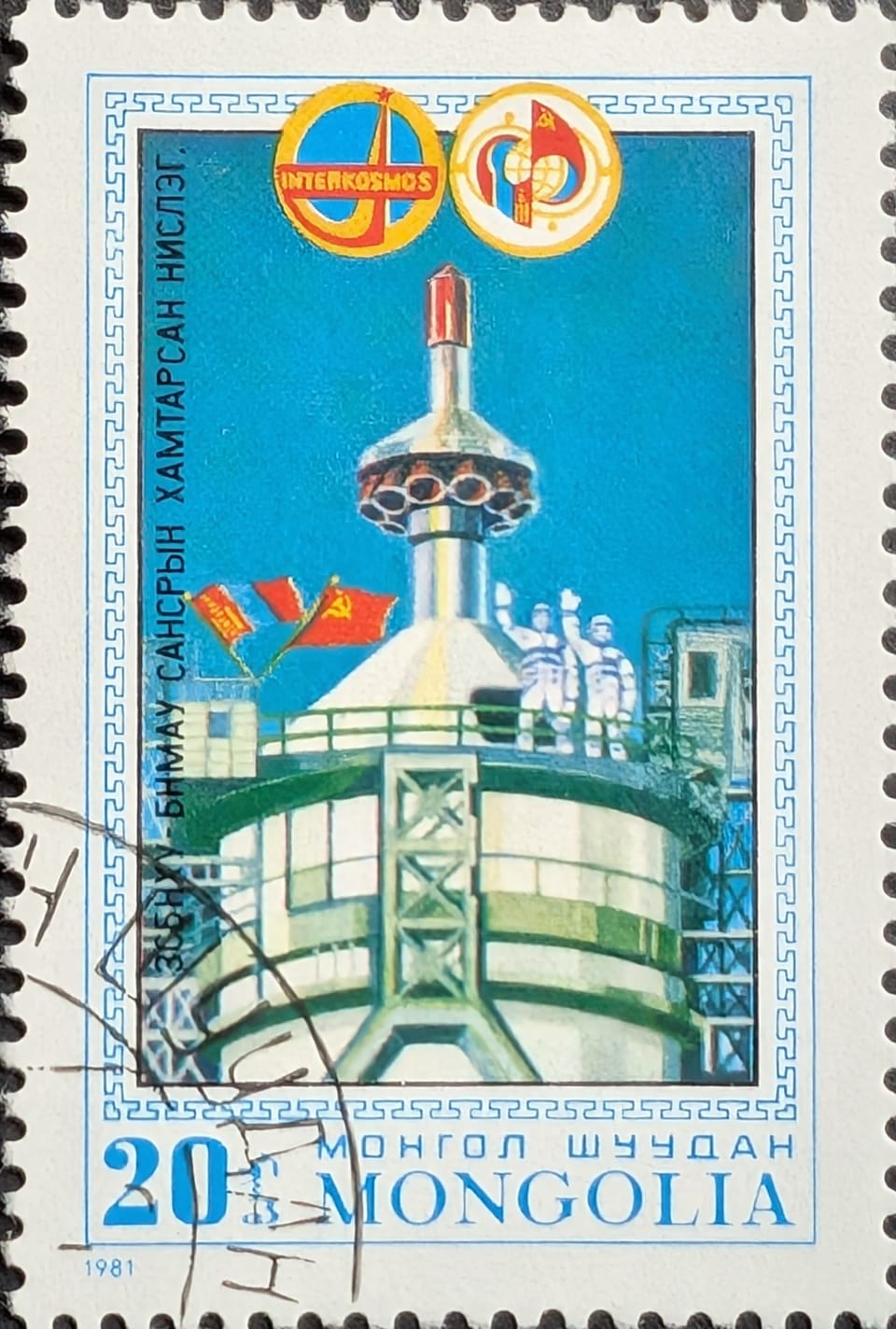
Happy New Year!
This is a summary report of 2024 space industry launch activities by the numbers. Analyses will come in later newsletters. Most of the data referenced in this summary will be available here: https://www.illdefined.space/2024-global-space-activity-dashboards/.
As noted in an earlier article, 2024 is a record-setting year when many metrics are used. Also, as observed in that same article, one company was responsible for the record-breaking: SpaceX. Likely, SpaceX’s dominance isn’t new news.
Starting with launches
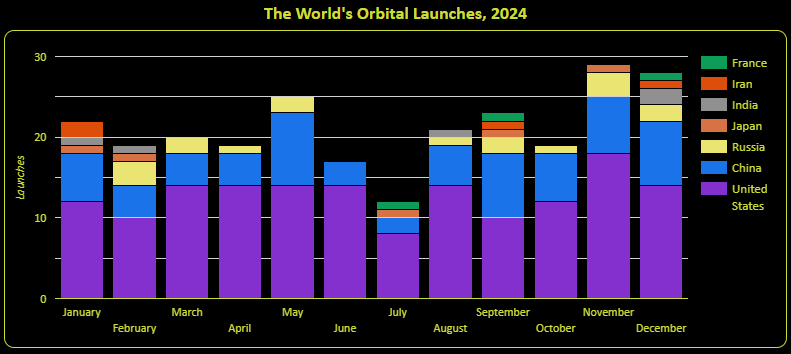
Launch services successfully conducted 254 orbital launches in 2024, a ~20% increase from 2023’s 212. Five new rockets were successfully launched for the first time in 2024. Only six nations hosted successful orbital launches in 2024 (down from nine in 2023). France’s Arianespace conducted the least orbital launches of the group–three–from its Kourou, French Guiana launch facility. Iran’s launch services conducted four launches, while India and Japan each conducted five orbital launches.
Russia’s Roscosmos and Defense Ministry conducted 17 launches from the nation’s various cosmodromes, and China’s launch services conducted 66 launches in 2024. U.S. launch services conducted 154 launches.
Launch shares in the treemap below highlight each nation’s various orbital-capable rockets and the companies launching them.
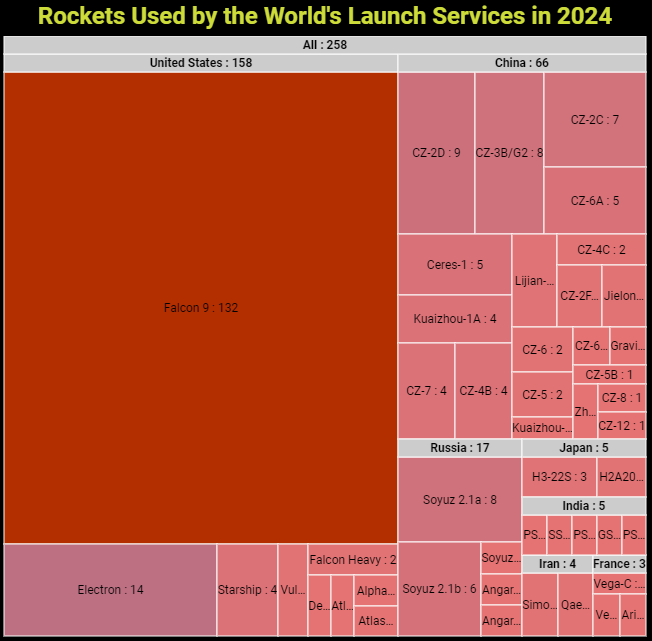
Twenty-one of the 254 orbital launches (~8%) were ridesharing missions (when three or more satellite missions are on one rocket). China's launch services flew nearly half (~43%) of the ridesharing missions. U.S. launch providers conducted six ridesharing missions, Russia’s conducted three, while organizations from Iran and Japan each conducted one.
Thirty-three orbital launches (~13%) used smallsat-dedicated rockets in 2024, such as the Ceres-1, Electron, or Kuaizhou-1A. U.S. launch services provided the bulk of the smallsat launches (15–Rocket Lab’s Electron accounted for 14 of those). China’s launch providers followed closely, launching 12 smallsat-dedicated rockets (Galactic Energy’s Ceres-1 rocket was used in five of those launches). Iran’s agencies launched four smallsat rockets, while France and India each launched one.
U.S. Launches: 154
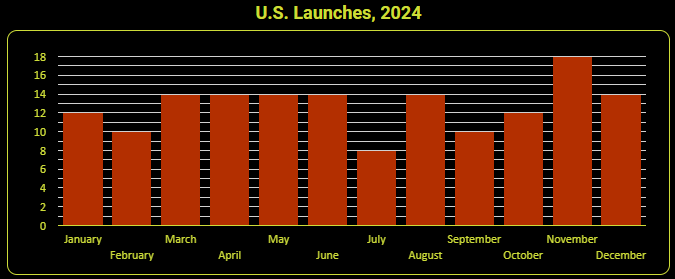
U.S. launch providers conducted 154, up 40% from 2023’s 110. The 154 U.S. launches were ~61% of orbital launches globally. They averaged nearly 13 launches per month, more than double China’s monthly launch cadence in 2024.
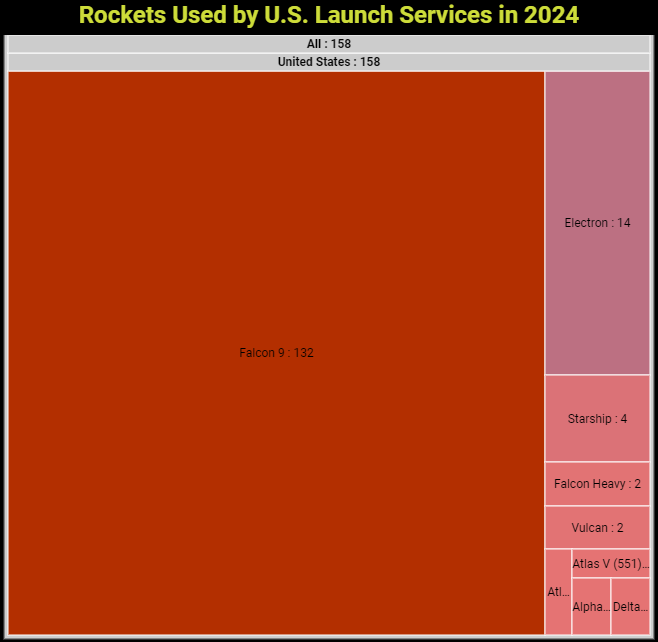
SpaceX conducted 87% of U.S. orbital launches in 2024 (and over half worldwide) at 134. While it didn’t reach its down-revised goal of 135, it still conducted ~40% more than the 96 SpaceX launches from the previous year. SpaceX launched its Falcon Heavy twice in 2024 but launched its Falcon 9 over 132 times. In 2023, the company had conducted five Falcon Heavy and 91 Falcon 9 launches. Starlink launches accounted for 89 of SpaceX’s 2024 total (~66%), meaning the U.S. total of launches not including Starlink would be 65 for 2024 (one less than China’s launch services).
Rocket Lab conducted 14 Electron launches (up 75% from 2023’s eight). United Launch Alliance conducted five (up from three launches in 2023), including the last of its Delta IV Heavy launches. ULA also successfully launched its Vulcan rocket for the first time in 2024. Firefly successfully launched a single Alpha (down from its two 2023 launches).
There were no outright U.S. orbital launch failures in 2024, a notable feat considering the increased launches from the nation’s launch providers. However, a second-stage malfunction from a successful Falcon 9 launch placed 20 satellites in an incorrect orbit in July. Only two of the Starlinks deployed from that mission remain in orbit as of December 30, 2024.
China Launches: 66
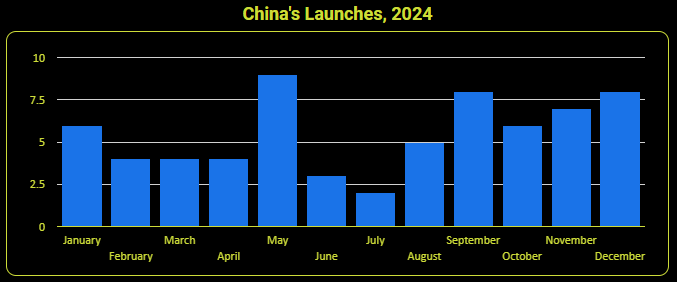
China’s launch providers conducted 66 launches in 2024, the same number as the previous year. They averaged about 5.5 launches per month in 2024. They garnered a ~26% share of the world’s 2024 orbital launches.
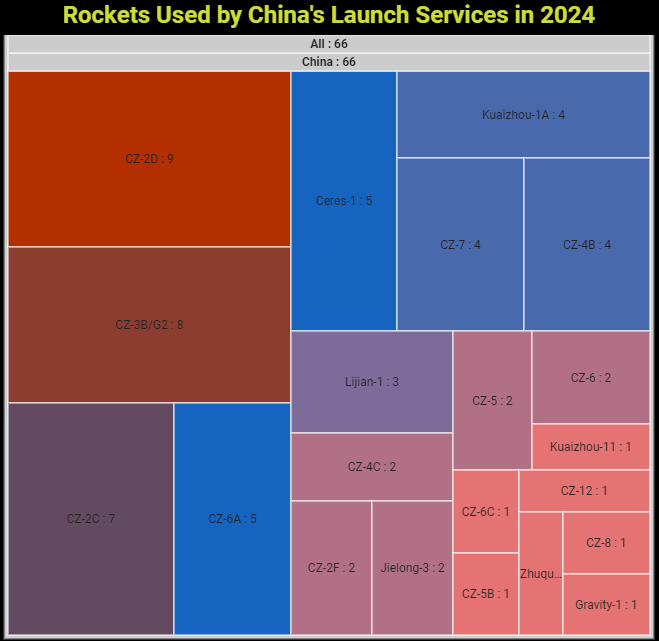
State-owned organizations conducted 57 (~86%) of the 66 launches from China in 2024 (an increase in share from 54 in 2023). Commercial launch providers in China conducted nine (~14%) launches, a 25% decrease from 12 in 2023. State-owned launch services made up four of the country’s top five most-launched rockets in 2024: CZ-2D (9–down from 13); CZ-3B (8–up from 6); CZ-2C (7–down from 9); CZ-6A (5–up from 2). Galactic Energy, a Chinese commercial company, launched its smallsat-dedicated Ceres-1 five times in 2024 (down from 6), giving it a ~56% share of all commercially run launches from China.
The remaining 28 state-run launches from China used 13 other rockets and variants (see the treemap for details), including the first launch of the CZ-6C. 2024 was also the first year in which the CZ-12 was launched. Of the remaining four commercially run launches, 2024 was the first year of OrienSpace’s Gravity-1 launch and the first launch of Landspace’s Zhuque-2E variant.
China’s launch services experienced two failures, featuring i-Space’s Hyperbola-1 and CAS Space’s Lijian-1. However, two failures out of 68 launch attempts is not a bad record.
Russia Launches: 17
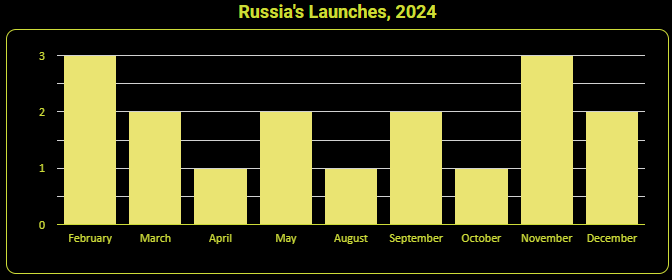
If months are missing, no launches occurred during them.
Russia’s state-owned launch providers conducted 17 launches in 2024, a ~11% decrease from the 19 launches they performed in 2023. They averaged nearly 1.5 launches per month. Russia’s share of the world’s orbital launches was ~7%.
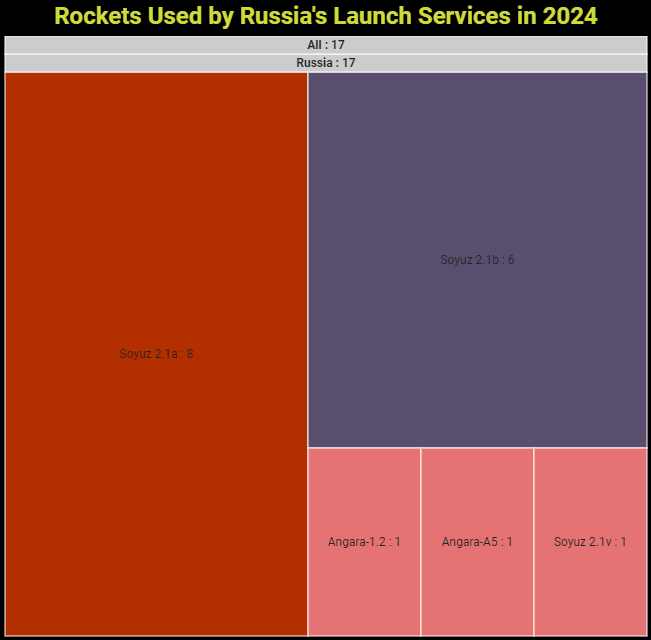
The Soyuz rocket variants (2.1a, 2.1b, and 2.1v) were used in 15 of the 17 launches, and Angara variants (A5 and 1.2) were used in the remaining two launches. Six of the 15 Soyuz launches were conducted to transport astronauts/cosmonauts or cargo to the International Space Station.
Japan Launches: 5
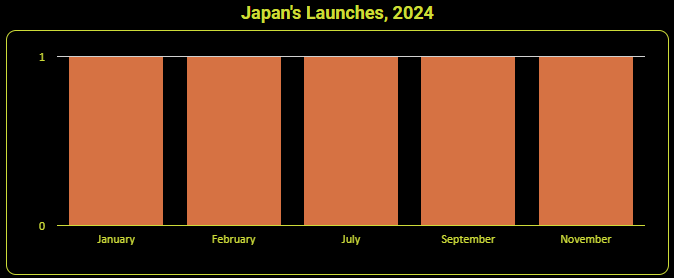
The Japan Aerospace Exploration Agency (JAXA) conducted five launches, a 150% increase from the two launches it conducted in 2023, averaging nearly one launch every two months. Japan’s five orbital launches gave it a ~2% share of the world’s 2024 launches. It was also the most rockets launched from that nation since 2020 (4).
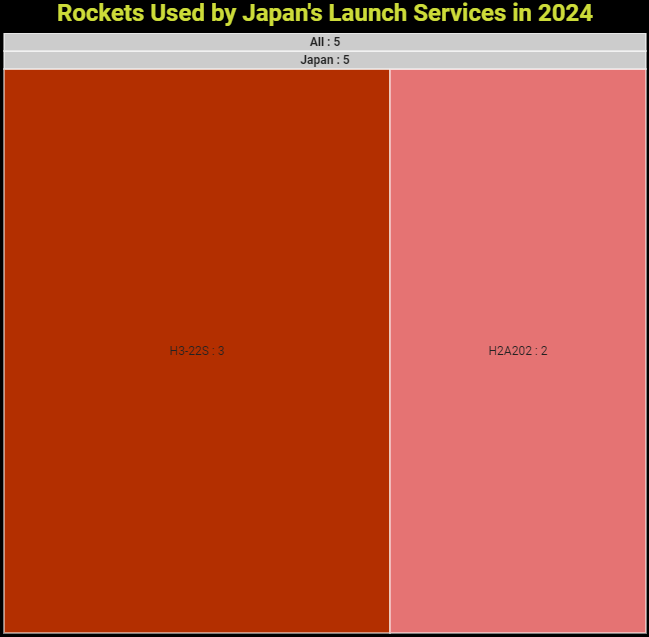
Three of the five orbital launches from Japan used Mitsubishi Heavy Industry’s newest rocket, the H3. The new rocket’s first successful launch was conducted in February 2024. The other two launches used the HIIA rocket.
Two commercial launch attempts were made in Japan during 2024. Space One, Ltd. used its Kairos rocket for both, but neither attempt was successful.
India Launches: 5
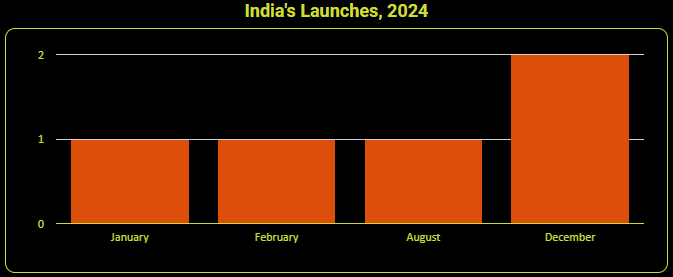
India’s launch providers conducted five launches in 2024, a 29% decrease from seven in 2023. As with Japan, India’s annual launch average was about one every two months. The five launches give India a ~2% share of global orbital launches.
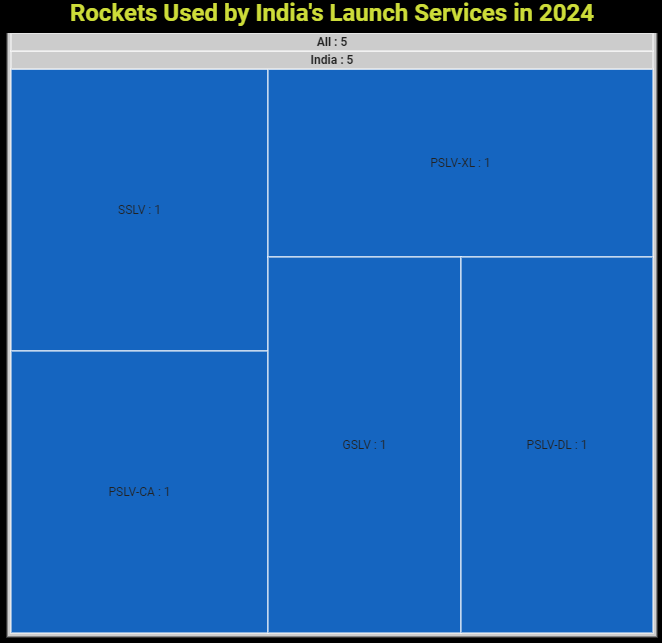
Three of the five launches used the Polar Satellite Launch Vehicle (PSLV). The Geosynchronous Satellite Launch Vehicle (GSLV) and the Small Satellite Launch Vehicle (SSLV) were each launched once in 2024.
Iran Launches: 4
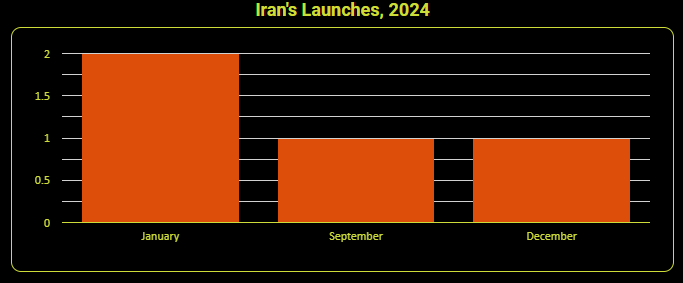
Iran’s state-owned launch providers conducted four smallsat-dedicated launches in 2024, a 300% increase from the single launch in 2023. They averaged one launch every three months. Iran’s four launches give it a ~1.6% share of global 2024 orbital launches.
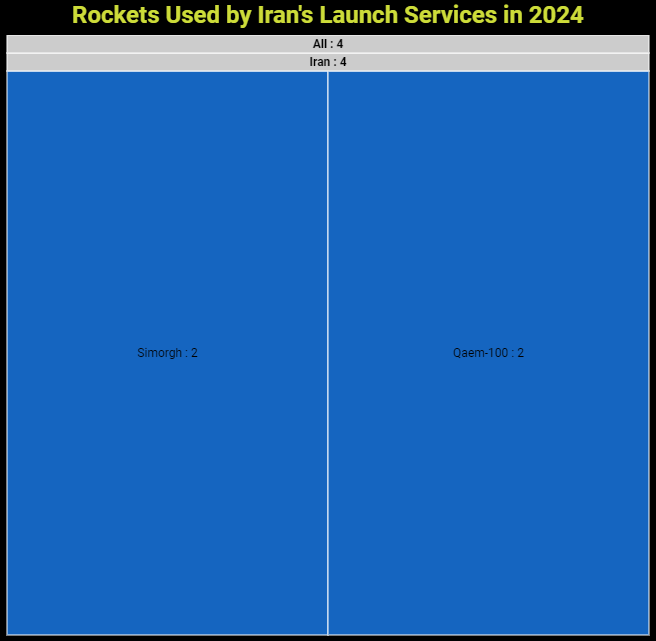
Two of the launches used the Simorgh rocket. The year's first launch was also the first successful Simorgh launch since its first successful 2016 launch. The other two launches used the Qaem 100.
France: 3
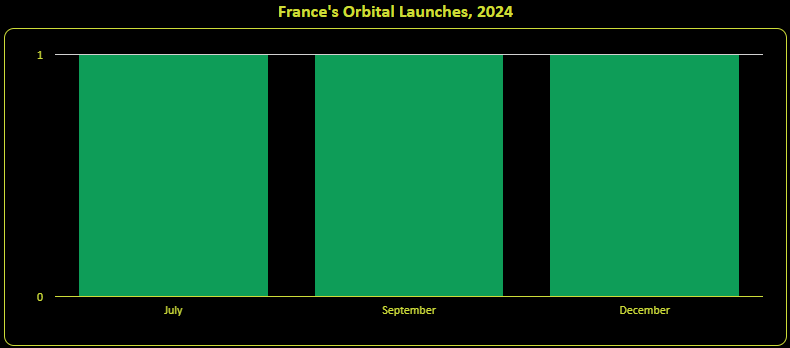
French launch service provider Arianespace conducted three orbital launches, the same number of launches the company performed in 2023. The company averaged one launch every four months during 2024. The three launches gave France’s launch service a ~1% share of the world’s launches in 2024.
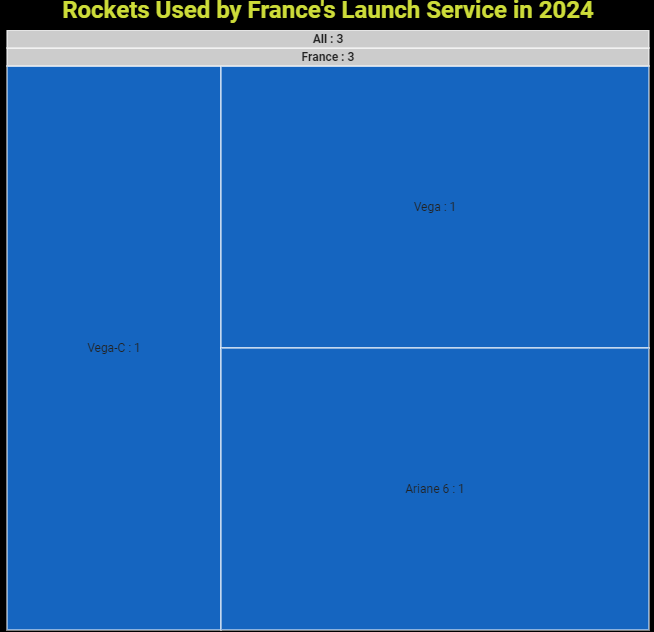
Arianespace conducted each launch using a different rocket. Perhaps the company's most meaningful launch was the first launch of its Ariane 6 rocket. Another launch used the Vega smallsat-dedicated rocket, while the third used the larger Vega-C rocket.
North Korea: 1 Failure
North Korea’s military attempted to launch an orbital rocket, the Chollima-1, but the attempt failed. It was the only other failure among the world’s launch attempts during 2024, with two from China and two from Japan.
That’s all the successful orbital launch activity. As noted, the analyses will come later. However, a summary of 2024’s spacecraft deployments will be released next week. If you’d like to play around with some of the charts, please go to the Global Space Activity Dashboard for 2024.
Putting this together takes a lot of time, as well as other skills and experiences. If you feel generous and have the means, I appreciate any donations (I like taking my family out now and then).
Paying for subscriptions is also an option. For the subscribers who have donated—THANK YOU from me and my family!!
Either or neither, please feel free to share this post!


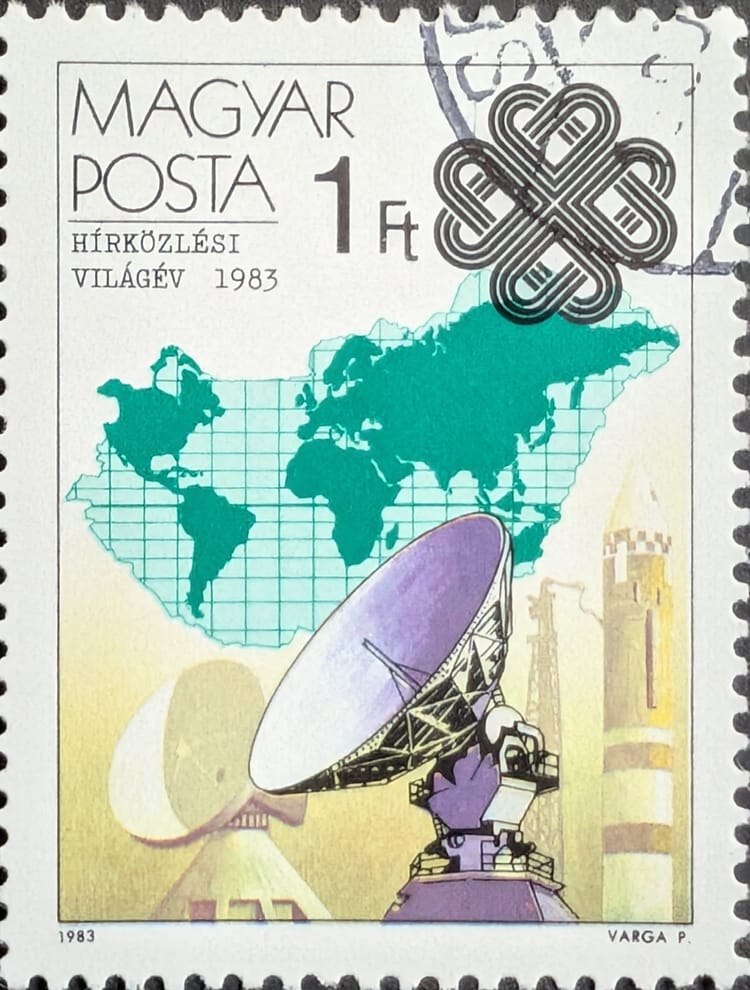

Comments ()